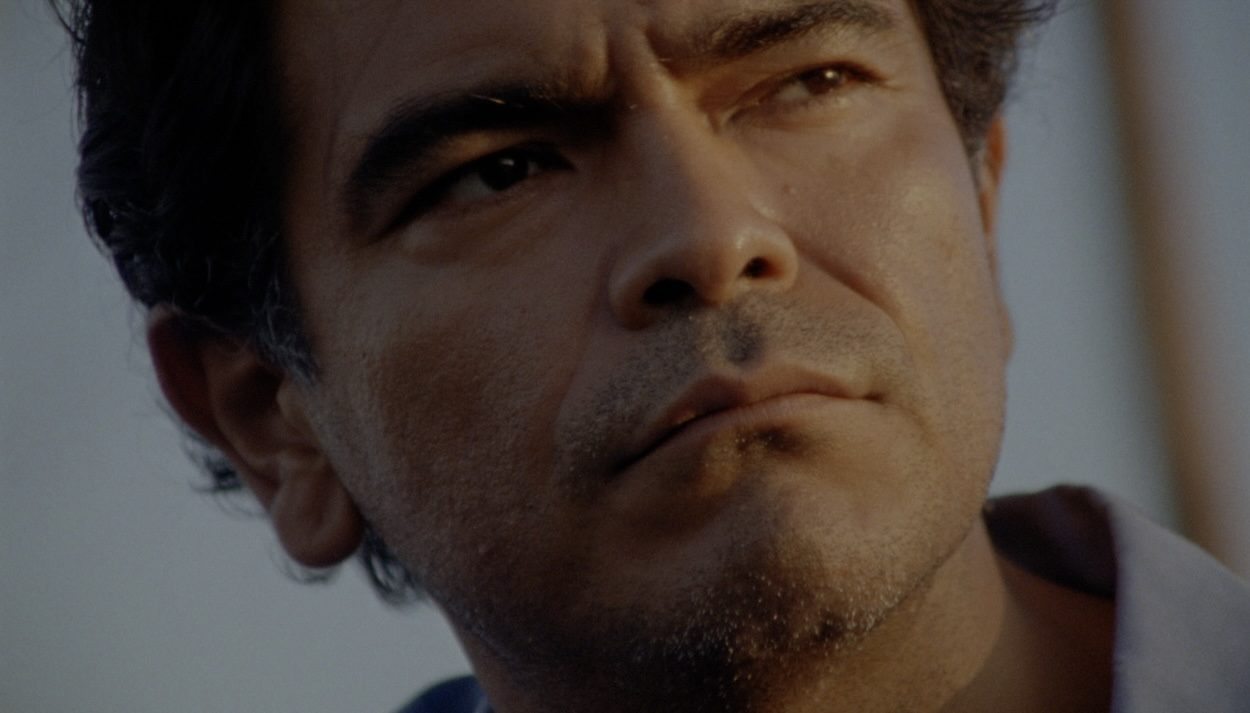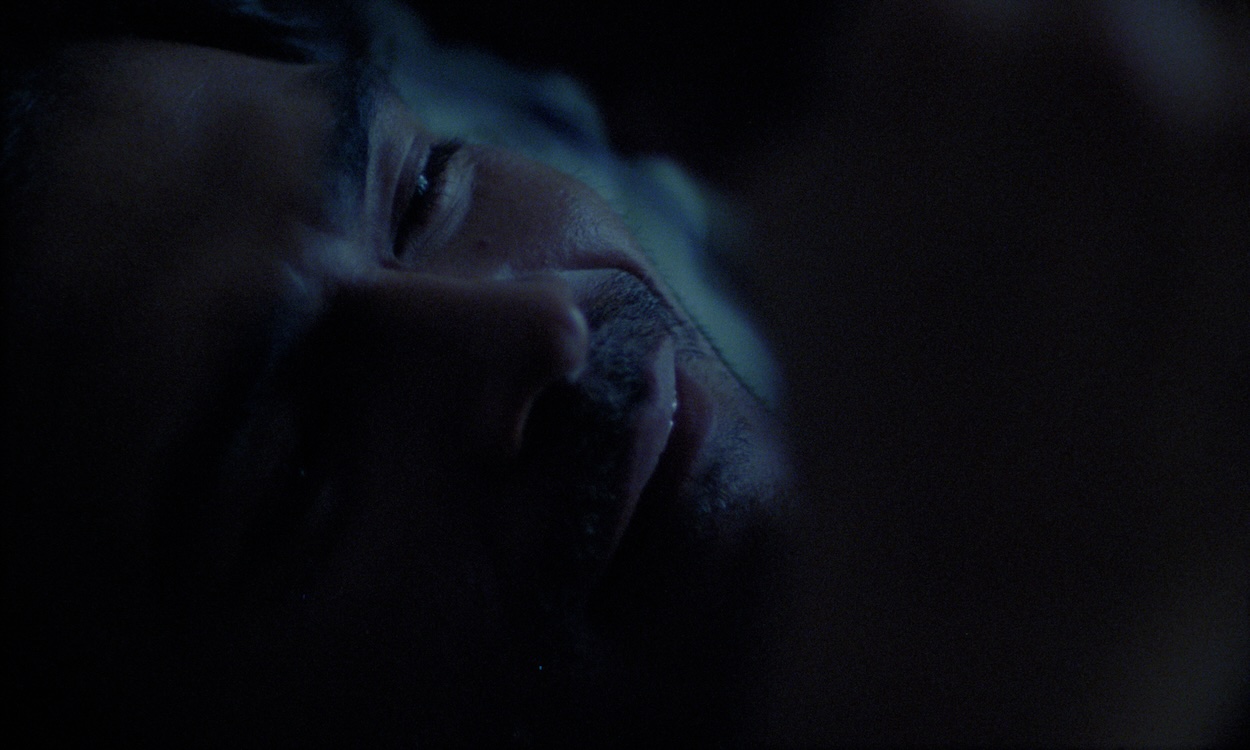What made you want to tell this story, and how long has it been in the making? How autobiographical is it?
I think that this film, in a lot of ways, has been with me for a while. For example, the conversation between SENIOR and his son in the truck was a scene I wrote over 10 years ago that just never found a home. I’ve always been shy about incorporating my personal life into my work. If I ever do pull from my own life for a film, I usually try to hide it within a character or convey it in an abstract way that only I would understand. For SENIOR, I knew that I wasn’t going to be able to, and didn’t want to, hide behind any of that.
As an adult, I’ve been working on building a relationship with my biological father. The film is based on a real person and real situations. But how or why it got to this point between us isn’t really the objective of the film. At the end of the day this film is really about finding empathy, for me and hopefully for the viewer as well.
The character of SENIOR is obviously flawed. But I hope that when you watch the film, it doesn’t feel as though I’m trying to draw conclusions or point blame. I hope that people can see on SENIOR’s face that he’s battling his own demons. And that’s something that’s taken me a long time to understand myself.
Frank Merino is absolutely compelling in the role, what made him the right choice for the part?
Frank really deserves all the credit. The whole script was based on the idea that we’re going to focus on one character for the entire film, and through their face that character needs to guide the story.
A friend actually referred me to Geraldine and Salome at CASTING DOUBLE in NYC. Luckily they liked the script and started to look for actors who fit the part. They put together 20-30 audition tapes for me to look through and it was definitely a very surreal week watching all these men audition to play my father.
In the beginning I was trying to find someone who looked the most similar to my father, but Frank’s tape was the one I kept going back to. It was about how he played the scenes through his face. The way he scrunches his forehead or cleared his throat between thoughts. He didn’t read any of the lines like it was a traditional drama, because I think he understood that it wasn’t going to be. Watching him approach the character with all seriousness and respect gave me the confidence boost I needed to actually make it. I’m very grateful that he gave as much as he did to my little film.
There are some shocking moments, such as the glass-eating scene, juxtaposed with more reflective moments, all of which add up to a multi-layered character portrait – how important was it to get across the complexity of your father’s character, and what do you hope viewers will take away from it?
I didn’t want to sugar coat the darker sides of this story, but I also didn’t want to dwell in them. Whenever the film feels like it’s building towards violence, an emotional breakthrough, lust – the colour red overtakes the screen. I guess it’s kind of like a child covering their eyes, now that I think about it.
But even seeing with your own eyes doesn’t always tell the whole story, so rebuilding these chapters of my father’s life, with the ability to zoom all the way in, allowed me to see the complexity of his character as well.
As I’ve gotten older I’ve felt a need to make peace with certain things and find sympathy anywhere I can. I hope that if there are viewers with a similar story, that they can do the same.
The overall look and feel of the film is moody and atmospheric, filled with tension and verging on claustrophobic – can you tell us a bit more about the cinematography, editing and grading choices you made to achieve that aesthetic?
First, I have to give credit to my incredible cinematographer Hayden Mason who really championed this film when I was still afraid to make it.
We knew that we wanted to shoot on 16mm because of the ambiguous time period in which it’s taking place but also because of the beautiful imperfections of film. I don’t think the film would have worked as well if it were digital and crisp. I feel like digital would have time-stamped us in a way.
We always knew that we would be focused on SENIOR for the entirety of the film, but as we started shooting, we just kept creeping in closer with long lenses. I think Hayden knew that if we exposed too much of the outside world around him, it would give it all away. We had to exist in this space between the real world and memories.
Hayden gave me a lot of photo books for reference before we shot, and he knew that he wanted to push the film to give us the contrast and depth it has. I think with anything shot on film, but especially this project, the most exciting part was getting the film scans back from the lab and seeing what we had. We had a lot of fun in-camera too. In the script, a lot of the transitions between scenes were described as “a blur of colours” so we had to figure out what that was going to look like.
None of the other characters – the mother, the son – appear on camera, what was behind that decision?
By holding SENIOR center frame, he can’t escape. And we can’t either, we have to watch. That allows us to see what no one was ever allowed to see, those moments of self doubt and regret on him. I wanted to see if he winced after saying something without thinking, if he cried when no one was around, etc.
It’s kinda like how in some old cartoons they would only show the legs and feet of the adults. In this story, it’s his world and everyone else is obscured or off-camera.
What were the biggest challenges that came up in production?
The biggest challenge for most filmmakers is funding their films. And we definitely had trouble doing that. I attempted to raise money during the pandemic, which didn’t work. In the end I had to find a way to finance the film myself.
Luckily I’m surrounded by a supportive community of friends and filmmakers here in LA. Most of our locations were willed together by friends of friends or luck. We only secured the truck used in the film the night before our shoot.
I wrote the film so that it could be shot relatively cheaply. But even still, we only had two days with our small crew to get everything we needed. It took a lot of work from a lot of really talented people to get it done. I honestly love the pressure that shooting on film applies, I feel like everyone respects when film is burning.
Personal projects are very often cathartic or therapeutic for the maker, what has been the personal impact on this film? And how has it been received by the rest of your family?
I made it through all these questions without using the word therapeutic, but obviously that’s exactly what this project was for me. Completing this film let me know that I can tackle something personal. Also, my mom loved it.
You say in your bio that you’re dedicated to telling stories that don’t always get told, in a way they don’t always get told – what’s in the pipeline for you after SENIOR?
I really have to change my bio! I just finished the script for my next short film that I’m really excited about. It does tackle family dynamics, but definitely not my own. And there will be many characters on screen at once in this one. We’re hoping to build enough momentum with the release of SENIOR to get the next one financed. And finally, thank you to anyone who watched our film.
INTERVIEW BY SELENA SCHLEH
Info:
@pablo_balderas
@haydenmason

















